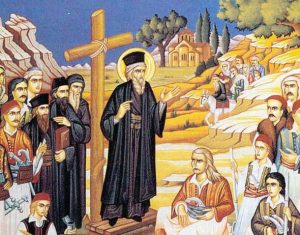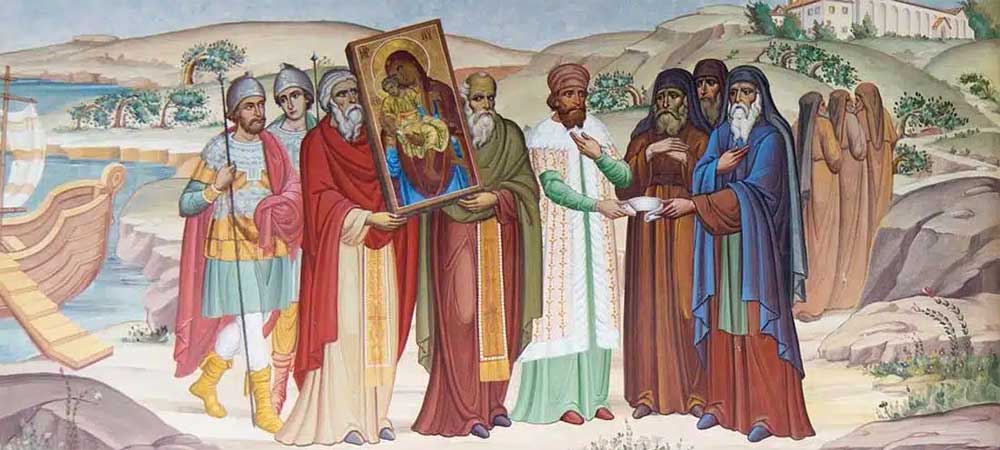Life of Saint Kosmas the Aetolian
 Saint Kosmas the Aetolian as the most active and imposing figure of the modern Greek Martyrology. His memory lives on to this day.
Saint Kosmas the Aetolian as the most active and imposing figure of the modern Greek Martyrology. His memory lives on to this day.
His baptismal name was Konstas and he was born in Megalo Dentro in Aetolia in 1714. He learned his first letters at the seminary of Gerasimos Lytsikas in Sigditsa, Fokida, and then attended classes at the Monastery of Agia Paraskevi in Vrangiana of Agrafa.
As soon as he finished school he worked as a teacher in the wider area of Nafpaktia and as soon as the Athoniada School was founded in Mount Athos he was one of its first students. He attended philosophy courses, with teachers Panagiotis Palamas, Evgenios Voulgaris and Nikolaos Tzartzoulis and studied in depth the Holy Bible and the work of the Church Fathers. In 1759, he assumed the monastic form in the Monastery of Agios Philotheus and received the name Kosmas. After a while he was ordained a priest.
The following year, at the exhortation of the Patriarch of Constantinople Sophronius II, who had appreciated his virtues and dynamic character, he began his missionary work in the enslaved nation, which continued uninterrupted for twenty years and sealed with his martyrdom. Father-Cosmas made four major tours in various regions of Hellenism, from Constantinople to the Peloponnese and from the Aegean islands to Albania. He preached the word of God in a simple and understandable language, while at the same time he strengthened the spirit of the enslaved people during the difficult years of the Turkish rule.
The ardent priest encouraged the establishment of schools and churches, because he considered the school a foundation for the religious and moral rebirth of the Greeks. “Better, my brother, to have a Greek school in your country than to have fountains and rivers,” he said. He criticized those Greeks who spoke Vlach or Albanian and urged them to teach their children Greek, because “our church is also in Greek”. From his letter to his brother Chrysanthos we are informed that he founded 10 Greek schools of the ancient Greek dialect and 200 primary schools.
Kosmas preached the obsession with the Orthodox faith. Love for God and love for neighbor are the two axes around which his teaching revolved most. “As a swallow needs two wings to fly in the air, so we need these two loves, because without them it is impossible to be saved” he said.
Love and reverence for God had to be manifested also by observing the Sunday holiday, which the Jews, however, destroyed with the bazaars. For this reason, during the last years of his activity, he attacked them with unusual sharpness. “Ten thousand Christians love me and one hates me. A thousand Turks with love and one not so much. Thousands of Jews want my death and one does not” he wrote to his brother Chrysanthos.
Father Kosmas with his sermon provoked the wrath of the Jews of Epirus, who denounced him as an instrument of the Russians and instigator of a Christian revolution against the Ottoman state in the Pasha of the region. Thus, while he was preaching the word of God in the village of Kolikodasi in Berati (today’s Berati in Albania) he was arrested on August 23, 1779 by order of the local ruler Kurt Pasha and the next day he was hanged from a tree on the banks of the river Apso. His body was thrown into the river, from where the vicar of the village retrieved it and buried it.
The character of his preaching is shown by his “Teachings”, which were preserved by his disciples, who followed him on his various tours and took notes. Cosmas is also known nowadays for his prophecies.
Of his many surviving prophecies, some refer to the liberation of the Race, others to the future of persons and cities, others to the future of mankind, and others to the amazing inventions of science.
